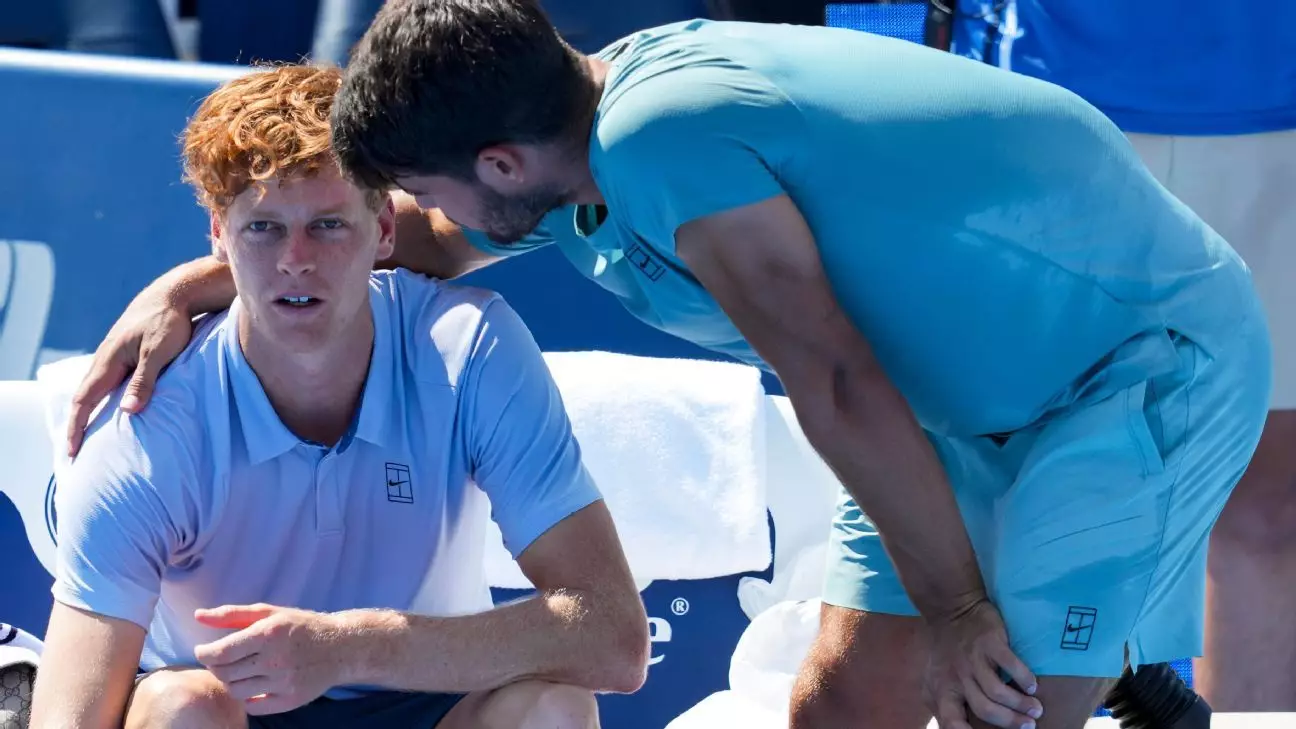The Cincinnati Open final was set to be a marquee clash between rising star Carlos Alcaraz and seasoned contender Jannik Sinner. Fans eagerly anticipated a fierce contest, a battle of titans that could redefine the hard court season. However, what unfolded was a stark reminder of the unpredictability inherent in sports—an event driven not solely by skill or strategy but also by circumstance. Sinner, seemingly in stellar form and riding a 12-match winning streak, was complicit to fate when illness abruptly curtailed his participation. His early retirement after just 22 minutes of play was not merely a physical setback but also a testament to the volatile nature of athletic pursuits, where health can abruptly overshadow preparation and skill.
This premature conclusion underscored the ruthless reality that no matter how hard one trains or how inspired their game, uncontrollable factors such as health emergencies can swiftly alter the course of a tournament. Alcaraz, who was poised for a demanding contest, was thrust into a position of dominance not by force of play but by Tm purely circumstantial turn of events. While some might view this outcome as anticlimactic, it’s undeniable that victories earned under unforeseen circumstances often carry a different, deeper significance. For Alcaraz, this was an opportunity seized—a reward that was earned not merely by his abilities but also by enduring the shadow of adversity that Sinner’s health crisis cast over their rivalry.
Alcaraz’s Assertion: Embracing Opportunities with Determination
Carlos Alcaraz’s response to the situation was both gracious and strategic. He acknowledged the unfortunate turn for Sinner, expressing well wishes for his recovery, while also recognizing his own achievement. It’s easy to dismiss such a victory as hollow or unearned; however, one must consider the mindset of a champion. Alcaraz’s focus was on the triumph, on elevating his status by capturing a significant title—his first Cincinnati trophy and an essential stepping stone toward year-end dominance.
His sentiment reveals a mature understanding: in tennis, as in life, opportunities often come unexpectedly. While the circumstances were unfortunate, Alcaraz demonstrated resilience and a positive attitude, traits that define a true champion. His victory is not merely a trophy on the shelf but a statement that he is ready to capitalize on every moment, regardless of how skewed the path might be. This win bolsters his confidence, offering a psychological edge heading into the U.S. Open, and signifies that in sports, adaptability and mental fortitude can turn a crisis into an occasion for greatness.
The Broader Context: Rivalries, Records, and Future Promises
The significance of this match extends beyond the immediate result; it’s a chapter in a larger narrative of emerging rivalries and historical benchmarks. Sinner’s withdrawal denied fans what could have been a thrilling rematch, deepening the narrative of their ongoing competitions. Their past encounters—whether at Wimbledon or the French Open—highlight the competitive hunger that fuels both players, yet this latest chapter was marked by injury and recovery more than rival tactics or strategy.
From a historical perspective, the Cincinnati final’s rare occurrence—only the third time in history a top seed has retired—underscores how abnormal and unprecedented this situation was. It also highlights the harsh realities that can intrude upon even the most promising sports vistas. For Alcaraz, this victory paves the way for potential dominance, especially given his rising trajectory and the momentum gathered from this latest success. The tournament’s role as a springboard to the U.S. Open adds an extra layer of importance: it reinforces that in tennis, readiness and resilience are essential for seizing fleeting opportunities.
Furthermore, the upcoming U.S. Open looms large as a battleground where Alcaraz’s current form and mental strength will be tested against the sport’s most elite players. His performance in Cincinnati serves as a testament to his readiness—an affirmation that even victories born from circumstances beyond pure athletic mastery can boost confidence and morale. Meanwhile, Sinner’s illness serves as a sobering reminder that health remains a pivotal factor in an athlete’s career, one that can abruptly tip the scales of momentum and opportunity.
In the end, Carlos Alcaraz’s Cincinnati win exemplifies the power of perseverance and strategic opportunism. The match itself may have been brief, but its implications resonate far into the future of men’s tennis, showcasing that sometimes, resilience amid adversity is the most formidable form of victory.

